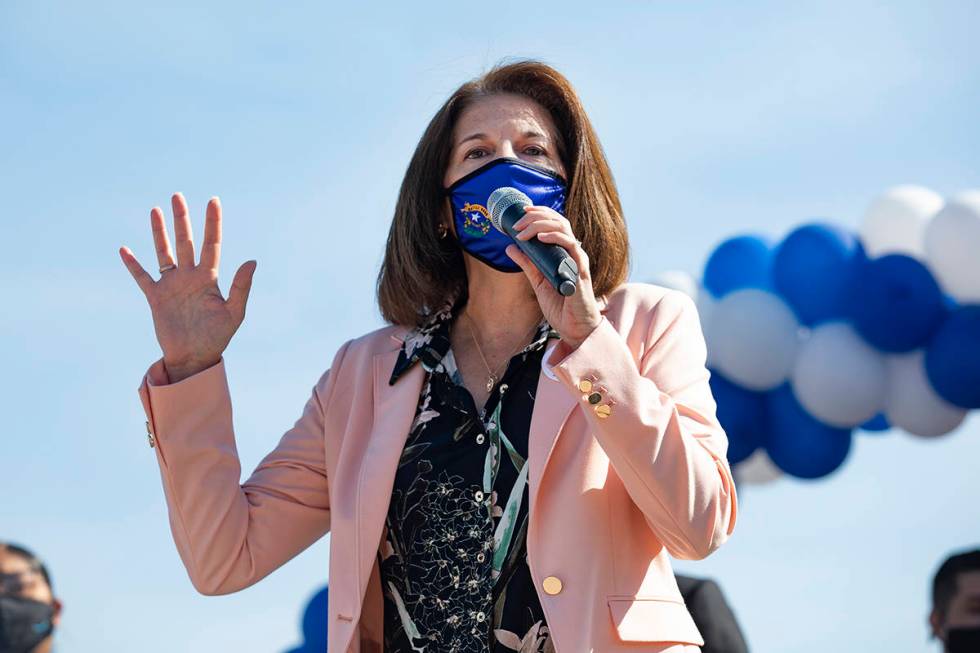Congress continues attempts for new COVID relief bill

WASHINGTON — House and Senate lawmakers will vote this week on a one-week temporary spending bill to keep the government open as Nevada representatives and senators push for relief in a final legislative package to address the economic fallout of the COVID-19 pandemic.
Public pressure is building for lawmakers to approve some relief by next week and the end of the 116th Congress.
“Because of the inaction of this chamber, most Nevadans who are hurting don’t have that reassurance that there will be immediate, swift relief for them because they don’t know when federal help will come,” said Sen. Catherine Cortez Masto, D-Nev., in a blistering Senate floor speech Tuesday.
Cortez Masto said that because of the economic devastation and lack of federal help, “what had been a thriving hospitality industry in Nevada, many of the jobs aren’t there right now, and too many workers can’t pay their bills.”
According to the U.S. Department of Labor, Las Vegas-Henderson ranks 51st among the nation’s largest cities for unemployment, with a rate of 13.8 percent.
About 175,000 Nevadans continue to claim unemployment insurance.
“Las Vegas is suffering from the highest unemployment rate of any metro area in the country,” said Rep. Dina Titus, D-Nev., who chairs the Congressional Travel and Tourism Caucus.
Titus said that without a relief package, “the situation is worsening by the day.”
She filed legislation last month that would require the Labor Department include hospitality in its apprenticeship program, a measure Rep. Steven Horsford, D-Nev., backed.
Horsford said travel and tourism jobs account for 30 percent of employment in Southern Nevada.
Las Vegas has seen a visitor decline of 57 percent since August of 2019, according to the Bureau of Labor Statistics.
Political delays
Titus and Cortez Masto blamed Senate Majority Leader Mitch McConnell, R-Ky., for failure to pass legislation drafted by the House months ago to help families, businesses and states, cities and tribal governments grappling with the pandemic.
But McConnell scoffed at the nearly $3 trillion price tag, and instead offered a smaller package that eliminated unemployment assistance and help for cities and states.
McConnell said Democrats voted against a Senate GOP bill in October that would have allowed more aid to small businesses and provided liability protection for employers, something Republicans still want included in any final bill.
The finger-pointing has carried on through Thanksgiving.
With one week before the end of this Congress, lawmakers in both the House and Senate are scrambling to piece together a $908 billion package that can address the needs of people shown on nightly newscasts who face an end to unemployment, eviction from apartments or closure of a small business.
In Wilmington, Delaware, President-elect Joe Biden said Tuesday he was encouraged by the bipartisan progress but said the bill would be only “start to more progress next year” as the virus continues to spread and hardship remains ahead.
Eviction wave coming
When the Center for Disease Control and Prevention eviction moratorium expires on Jan. 1, “Nevada is bracing for 250,000 to 400,000 possible evictions,” Cortez Masto said.
“That’s more than 20 times the national number of evictions in 2019,” she noted.
And that’s not the only pandemic problem in the state. Hospitals and medical centers say there is a shortage of blood due to infections.
“There’s always a need for #blood donations, but there are critical shortages right now due to #COVID19,” wrote Clark County’s government on its Twitter account.
With protocols in place, “It’s safe to donate and our employees are answering the call to give today,” the county wrote.
Meanwhile, a bipartisan group of lawmakers that includes Rep. Susie Lee, D-Nev., and Rep. Mark Amodei, R-Nev., have helped craft the legislative measure designed to pass in this hyper-partisan Congress and get the signature of President Donald Trump, a lame-duck officeholder who will be out of the White House on Jan. 20.
Lee said that thanks to the bipartisan Problem Solvers Caucus, which consists of members from both major political parties, there is momentum to get a relief bill “across the finish line.”
“Every day we wait adds that much more weight onto the back of every American,” Lee said. “Let’s capitalize on this momentum.”
Timeline for relief
Lawmakers hope to pass a temporary spending bill this week, which will give them until next week to finalize a deal with details on what the final relief bill would contain. Whether it will contain stimulus checks is uncertain.
Sen. Bernie Sanders, I-Vt., and several other senators are urging leaders to include a $1,200 stimulus check in the package, a proposal that McConnell has dismissed.
Unemployment assistance and other programs for the unemployed must be included in any relief legislation moving forward, said Sen. Jacky Rosen, D-Nev.
“We are still in the middle of an unemployment crisis,” Rosen said.
And small businesses are clinging to hope going into the holidays that they can survive into next year when the promise of a vaccine and customers can return to brick and mortar shops and restaurants.
After six monthly gains following the spring lockdowns for COVID-19, the restaurant industry employment recovery stalled in November, according to Bruce Grindy, chief economist with the National Restaurant Association.
An estimated 17,400 jobs were lost in November, according to seasonally adjusted, preliminary data with the Bureau of Labor Statistics.
The November employment decline wasn’t a complete surprise, as restaurant sales growth ground to a halt in October. As a result, the restaurant industry remains 2.1 million jobs below its pre-coronavirus level, according to Grindy.
Earlier this month, the city of Henderson gave $10,000 grants to 100 eligible restaurants to help them with the financial decline and save businesses from faltering. Henderson hoped to help 200 restaurants.
Contact Gary Martin at gmartin@reviewjournal.com or 202-662-7390. Follow @garymartindc on Twitter.